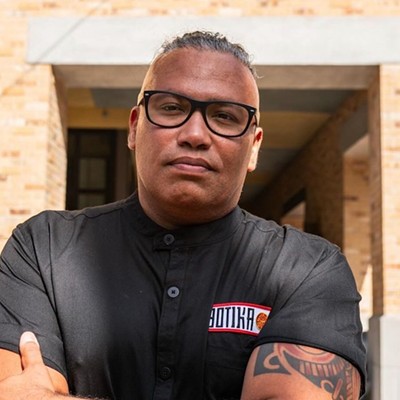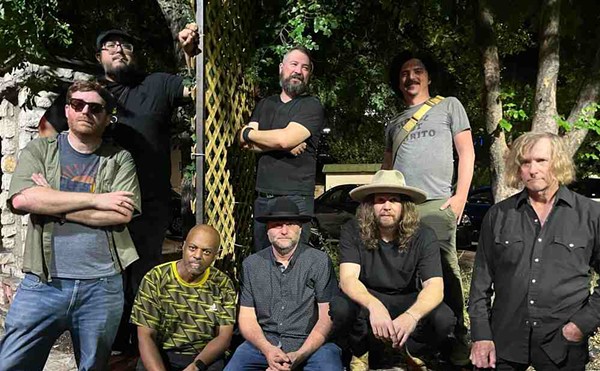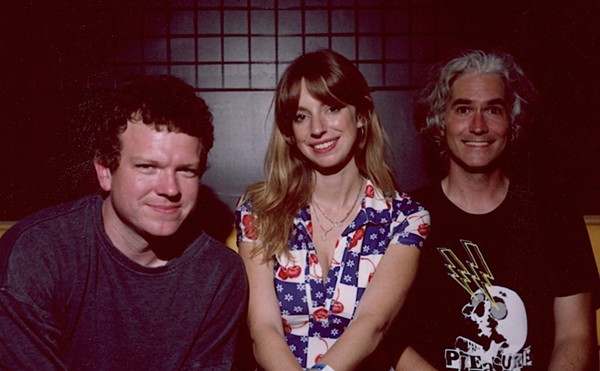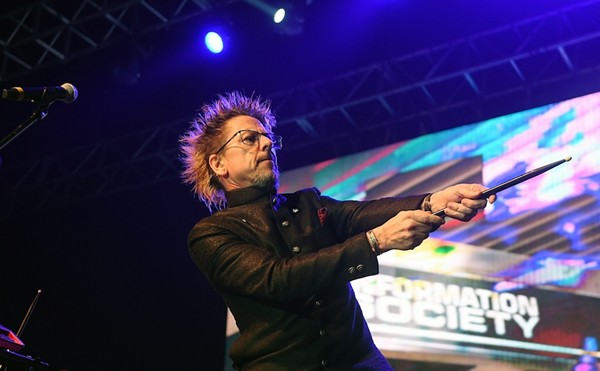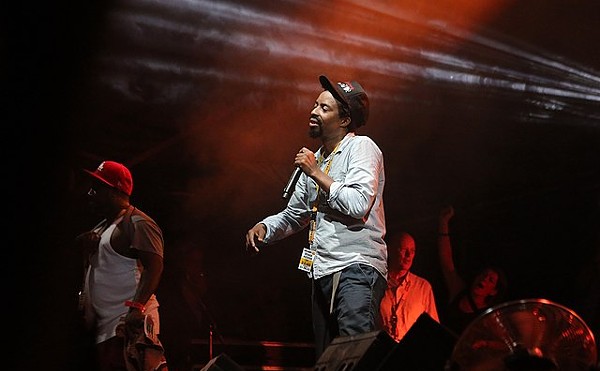The (made-up) story of hip-hop’s invention: Three guys are passing around a microphone (it doesn’t have to have been plugged in, but there had to be a microphone). What the first guy says doesn’t really matter ’cause he invented hip-hop. The second guy says how much better he is than the first guy. The third guy accuses the second guy of killing hip-hop and promises to resurrect it and return it to the former glory days of the first guy.
A (made-up) hip-hop fact: Every two minutes, someone in this country is uploading a shitty mixtape. Every one of these claims it’s giving hip-hop the Lazarus treatment.
This one’s true: Pronouncing hip-hop dead then reaching for the defibrillator paddles is common. Pronouncing hip-hop dead and then pecking at its eyes, not so much.
“When a real vulture gets agitated, it’ll throw up,” says head Vulture beatmaker Ryan Stanton, aka Ruler Why. “We’re surrounded by all this shit on the radio, and it’s making us throw up on the mic.” Stanton, 21, keeps explaining, but you get the idea. “We like to say we’re ‘feasting on rotten hip-hop.’”
If you prefer your flesh-eating metaphors in Lion King terms, the Vultures’ MySpace page claims the San Antonio hip-hop collective is “restoring balance to the hip-hop ecosystem.” That’s probably a joke, but it might as well be a mission statement. Despite all their on-record boasting, none of the Vultures seems to be nursing a messiah complex. If hip-hop — or the exposed-nerve, visceral kind they prefer — is really dead, Ruler and co. will eat what they can to fuel their own music.
Stanton, 21, has been freestyling since his days at MacArthur High School, but he says he didn’t really pursue hip-hop seriously until a “life-changing” free Wu-Tang Clan show at Austin’s Stubbs in 2005 convinced him to buy a beat machine.
“I’m a young blood in this,” Stanton says. He might have only four years’ experience, but his production skills have convinced six other MCs between the ages of 22 and 34 to join him, and the beat he made for Brooklyn Academy’s “Told U,” featuring Jedi Mind Tricks’ Vinnie Paz, was included on a JMT compilation.
“We both started making beats together, but Ryan got a lot better at them than I did,” says longtime friend and fellow founding Vulture James McGowan, aka Jus the Destroyer, whom Stanton credits with expanding his hip-hop knowledge. That McGowan, 22, a fan of mid-to-late ’90s underground hip-hop, likes Stanton’s work is practically a given. Stanton expectedly borrows heavily from Wu-Tang’s RZA, but only in sensibility, and he seems to have a preternatural knack for creating the night-black, suffocating beats that push MCs to spit dense, vicious lyrics like this verse from the third Vultures founder, Roshard Mills, aka Jamar Equality:
My flow is mad debted to anyone who want it raw/ I said it/ Commercial guests be sweeter than a diabetic/ on a strictly diet/ I’m causing havoc like a city riot/ You paper plane, I’m airport, now who’s really fly-er?/ My veins become the microphone wires/
Liars, no skill, cannot respond that’s why they die over bills/ I got my eyes on the hills in case you copy my skills/ Best believe when it’s time to eat I got my fork in your meals/ The fuck is the deal?/ I’m molten rock lava, spit the hottest shit/ Don dada lick a shot proper at your sorry click/It’s hard to diss when you have trouble keeping fires lit/ Ask Tre-Flipping/ He’ll tell you it’s the arsonist/ Boss carnage, darts a little sharper than your armor, dawg/ Aren’t y’all ashamed? We shining harder than some Armor-All/ I dread listening to wack shit like a conference call/ Equals signin’ off, with my apologies to all of y’all.
Consider that’s all delivered in less than 45 seconds (get a stopwatch and try timing yourself if you don’t realize how ridiculous that is) and you’ve got a pretty good idea of the sound the Vultures are going for. It’s important to keep in mind that Equality’s flow is breathless but mostly intelligible — there’s none of the rushed, show-offy feel you get from Twista or Bone Thugs. He seems natural and comfortable talking much faster than any Texan should (he says people often confuse him for an East Coaster). The lines are also indicative of some common Vultures themes — aggressive boasting and intimidation, disdain for wack MCs and “commercial” hip-hop, the bread and butter of “underground” MCs from El-P to MF Doom — and a pretty fair representation of their hit-and-miss lyrical style. For every predictable reference, awkward wording, or downright confusing line, there’s a good punch line or serviceable metaphor immediately taking its place, but you don’t really have time to contemplate either. The ceaseless stream-of-conscious delivery does something that’s generally certain death in pop music: It forces you to pay attention. There’s no hook to hold on to — no sooner has Equality run out of breath than another MC steps in to take over at the same frantic pace — and you probably couldn’t dance to it at gunpoint. But those aren’t really criticisms since that’s exactly what the Vultures meant to do.
Their first night together, Destroyer, Ruler, and Equality recorded “Plot the Apocalypse,” the original Vultures’ track, definitely derivative but noticeably skilled. The looping string samples over stark drum machine, dependence on Wu-Tang slang, and goofy Ghostbusters dialog samples sound a hell of a lot like the work of three teenagers trying to create their idea of underground hip-hop, but their confidence and talent is already apparent.
Producer Destroyer’s robot-mimicking record scratches keep the beat from growing stale, and the relentless tempo requires some linguistic skill just to ride. Ironically, it’s Equality, whose taste in music seems most contemporary (he calls the radio a “satanic device,” but he’s a big fan of Detroit’s Black Milk and Royce Da 5’9”, for example, and he even finds room in his heart for the first few Lil Wayne albums) who owes the most to RZA on this track — his rapid-fire deadpan and Dada lyrics are at times practically a dead ringer (check out the way he delivers “intergalactic radiation, armed proton cannons/ Machines are on the rise, substantial molecule-shaped planets” like it’s essential information you should’ve known already.)
“It was like the perfect combination,” is how Equality describes the formation of the original Vultures trinity. “We were all in the same mindstate and all listened to the same music.”
Citing the repetitive beat and tossed-off materialistic freestyle flow of Lil Wayne’s “A Milli” as an example, McGowan criticizes modern mainstream hip-hop as “uncreative” and disingenuous.
“They rap about stuff they don’t do, guns and killing people,” McGowan says. “I’d rather hear something more original.”
Though McGowan and the other Vultures trade heavily in battle rhymes, probably hip-hop’s most ancient form, the difference he says is all in the approach. Matt Smith, aka Blazy, the newest member to join, explains it like this:
“You can talk about clothes and money and jewels and all that without being weak-minded,” he says. “There’s just a certain way to spit it. If you’re going to talk about diamonds, tell me how you got the diamonds, where they came from, how they had to be mined from the ground. If you’re going to talk about cash, tell me a story about how you got it.”
Blazy’s high-school friend and fellow Vulture Stealth — who refuses to reveal his real name or age, but who’s old enough to prefer Public Enemy and Tribe Called Quest to Wu-Tang because he heard those PE and Native Tongues albums when they were originally released — is more explicit.
“I hate all these bling rappers,” he says. “It’s time for some real shit. 98.5 the Beat can suck a dick, and you can print that.”
Ishmaael Rhafiq, aka 7ish — the oldest Vulture at 34, who grew up scratching on his mom’s salsa records and listening to DJ Jazzy Jeff in South Philadelphia — complains “music don’t bang the way it used to. It don’t have no emotion. It don’t have no soul to it. It don’t shed no light.”
And to 7ish, music means more than a killer bass line or creative wordplay.
“My mom passed when I was 9,” he says. “I tried to wake her up, and she didn’t ever get up. Hip-hop is like my second mother. To me that’s what hip-hop’s about, the positive destroying the negative in life.”
7ish compares modern hip-hop to a “bad religion,” in which trends are pursued like dogmas and originality is constantly sacrificed to ringtone sales.
“If you’re not talking about how many sneakers you got, you ain’t popular,” he says. “I guess we L-7.”
But the best music, he says, always comes from outsiders who ignore the fads.
“It was always people just being themselves,” 7ish says. “Rakim didn’t sound like KRS-One and KRS-One didn’t sound like Big Daddy Kane.”
7ish says the Vultures want to lead the return to the golden age.
“We try to take it back, to produce the sound from the soul,” he says.
Stealth disagrees: Hip-hop’s too far gone for anybody to save it.
“We can never go back,” he complains. “It’s too contaminated. It’s like a bucket of pure water that people shit and pissed in.”
The best rappers can hope for in the post-Master P days of “disposable hip-hop,” Stealth says, is to provide listeners with the “raw shit, the gritty shit.”
“Raw is raw emotion,” he continues. “Raw is scratching my nuts outside in my boxers even if the neighbors are looking.”
But all the semantics, theorizing, and fanboy bitching don’t matter if the music doesn’t hold up to the high standards they’re setting for everyone else. Four years after they recorded their first track, “Underground Mindstate,” an as yet unfinished track from their upcoming album, sounds like a group struggling to craft its influences into something new and personal, and finding some actual success. Producer Ruler, who lists jazz pianist Duke Ellington among his favorite musicians, has branched out beyond the signature moves of first-wave Wu production (sharp strings and elementary key loops). He says he toyed with creating songs from self-recorded keyboard loops before deciding he’s much better at sample-based production. Digging through crates of obscure psychedelic records and movie soundtracks has yielded an eerie spaghetti-western chorale to back the still sci-fi-obsessed lyrics. Nothing revolutionary exactly, but some kind of warped mouth-harp sound is a nearly grating gamble that pays off, and vocal-sample manipulations and repeated scratching add an element of pure playtime that’s straight from the mid-’80s. And if the rhymes aren’t to Wu standards (and whose are, really?) the guys could still rap circles around a lot of the featured acts on those Wu affiliate CDS. The additional MCs bring more variety and a different diet of influences to feed from. Nobody on the track sounds like anyone else, and that’s one of Destroyer’s main goals.
“We don’t want to sound like them,” he says, after rattling off a list of his biggest influences. “We want to find our own style. We don’t expect to make money from it. We just want to be heard.” •





